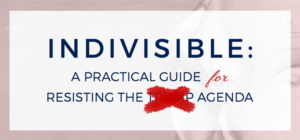Interesting things are happening in the United States, ahead of the inauguration of President-elect Donald J. Trump.
Watch this:
And what is “Indivisible?”
To put it very briefly, it’s a how-to guide, written by former Congressional staffers, intended to share best practices in organising effective opposition to the emerging policies and directions being set by the incoming Republican President.
Personal preferences aside (and not to mention the fact that I’m not particularly invested in American politics being a foreign national), this work – and the momentum it is building – is of particular interest to me because of its voter education value.
As voter educators, one of the things we ALWAYS say is that a voter’s engagement should not start and end with casting the ballot. Prior to election day, VoterEd emphasises the voter’s responsibility to educate himself about the issues and about the candidates seeking his vote; after election day, VoterEd encourages voters to be more actively engaged with their elected representatives to make sure that they remain true to their electoral mandate.
Indivisible focuses very sharply on the post-election day scenario and provides very practical advice on how ordinary people can effectively make their voices heard by their elected representatives. This is not something we have a lot of experience in, in the Philippine setting.
Here, after the elections, people tend to lapse back into a kind of obliviousness broken only by the stimulus of government scandals and congressional hearings. In other words, we tend to leave politics to the politicians we’ve installed in office. But that’s not how it should work.
Needless to say, politicians tend to profit from this lackadaisical attitude by the governed towards their government. And if politicians learn that they can do pretty much anything as long as they give good performances just before elections, then they WILL do anything they want, oftentimes without even paying lip-service to the truism that public office is a public trust.
Indivisible, however, offers a handy guide to how that state of affairs can be turned around, by essentially equipping ordinary voters with the knowledge and the strategies needed to mount an effective grassroots campaign to get elected officials to sit-up and take notice. More importantly, Indivisible presents a viable alternative to simply relying on so-called cause oriented groups, which very often are coopted by vested political interests or may even simply be photogenic fronts pushing unseen political agendas.
By empowering ordinary voters in this way, this document breathes life into the ideal of post-election engagement that VoterEd has been preaching. Just cross out the name Trump.

Note, of course, that not all the strategies and best practices outlined here would work in the Philippine-setting. But look at the sub-title of this website you’re on: IDEAS > PERSONALITIES. That’s the point. Ideas, such as those contained in Indivisible, are greater than on-the-ground details and therefore can be used as a springboard for other bright ideas – ones that fit our environment perfectly.
So it is worth a read, keeping in mind that we shouldn’t zero in too much on personalities but on the potential to empower voters.
Here. Have a go at it.
[btnsx id=”787″]

